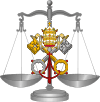Motu proprio
 |
| Part of a series on the |
| Jurisprudence of Catholic canon law |
|---|
|
|
|
Trials and tribunals |
|
Canonical structures Particular churches
|
|
|
A motu proprio (Latin for: "on his own impulse") is a document issued by the Pope (or by a monarch) on his own initiative and personally signed by him.[1]
When issued by the Pope, a motu proprio may be addressed to the whole Church, to part of it, or to some individuals.[1] A document issued motu proprio has its legal effect even if the reasons given for its issuance are found to be false or fraudulent, a fact which would normally render the document invalid. Its validity is based on its issuance by the pope by his own initiative, not upon the reasons alleged.
The first motu proprio was promulgated by Pope Innocent VIII in 1484. It continues to be a common form of Papal rescripts, especially when establishing institutions, making minor changes to law or procedure, and when granting favours to persons or institutions.[2]
Effect
An important effect of the issue of a document in this way is that a rescript containing the clause "motu proprio" is valid and produces its effect even in cases where fraud would ordinarily have vitiated the document, since the Pope does not rely on the reasons alleged when he grants a favour.[2] Withholding of the truth in what, according to canonical law, style and practice, must for validity be expressed, normally renders a rescript invalid, but not if the rescript is issued "motu proprio".[3] Consequently, canonists traditionally called the clause the "mother of repose".[2] The designation "motu proprio" indicates that the validity of the document is independent of the validity of whatever reasons may have been adduced in a request for its issuance.[2]
However, a motu proprio has no effect in so far as it harms the acquired right of another or is contrary to a law[4] or approved custom, unless it expressly states that it is derogating from these matters.[5]
Form
A motu proprio rescript begins by giving the reasons for issuing it, and then indicates the law or regulation made or the favour granted. It is less formal than a constitution and carries no papal seal. Its content may be instructional (e.g., on the use of chant), administrative (e.g., concerning a church law or the establishment of a commission), or merely to confer a special favour.[6]
Notable examples
- Tra le sollecitudini, issued 22 November 1903 by Pope Pius X, on the topic of music to be used during Mass
- Bonum sane, issued 25 July 1920 by Pope Benedict XV, on the topic of world politics
- Mysterii Paschalis, issued 14 February 1969 by Pope Paul VI, revising the Norms on the liturgical year and the General Roman Calendar
- Ad Tuendam Fidem, issued 15 July 1998 by Pope John Paul II, on topics in canon law
- Summorum Pontificum, issued 14 September 2007 by Pope Benedict XVI, on the use of the Tridentine Mass and other liturgical topics
- Intima Ecclesiae natura, issued 11 November 2012 by Pope Benedict XVI, on the service of charity (guidelines for Catholic charitable organizations)[7]
Other uses of the phrase "motu proprio"
More generically, the Latin phrase is used to indicate "of his own accord" and is thus similar to "sua sponte". It is used very rarely in legal opinions in the United States: the better known term "sua sponte" is preferred. As it relates to a monarch, the term motu proprio describes the condition of a royal decree being made expressly on the sovereign's initiative, a practice more usual in some nations than in others. The term "Proprio motu" is used to refer to a decision by the Prosecutor of the International Criminal Court to initiate an investigation into a situation without a referral from the Security Council or a State Party; this power is granted by article 15(1) of the Rome Statute.
References
- 1 2 Oxford Dictionary of the Christian Church (Oxford University Press 2005 ISBN 978-0-19-280290-3), s.v. motu proprio
- 1 2 3 4 Catholic Encyclopedia, s.v. Motu Proprio
- ↑ Code of Canon Law, canon 63 §1
- ↑ According to the article in the 1911 Catholic Encyclopedia, a motu proprio was at that time considered valid even if counter to ecclesiastical law.
- ↑ Code of Canon Law, canon 38
- ↑ Encyclopædia Britannica online, s.v. motu proprio
- ↑ http://www.vatican.va/holy_father/benedict_xvi/motu_proprio/documents/hf_ben-xvi_motu-proprio_20121111_caritas_en.html
External links
- New Advent: Catholic Encyclopedia (1911): Motu Proprio
- Encyclopædia Britannica online: motu proprio
- Motu proprios of Pope Paul VI
- Motu proprios of Pope John Paul II
- Motu proprios of Pope Benedict XVI
- Motu proprios of Pope Francis
